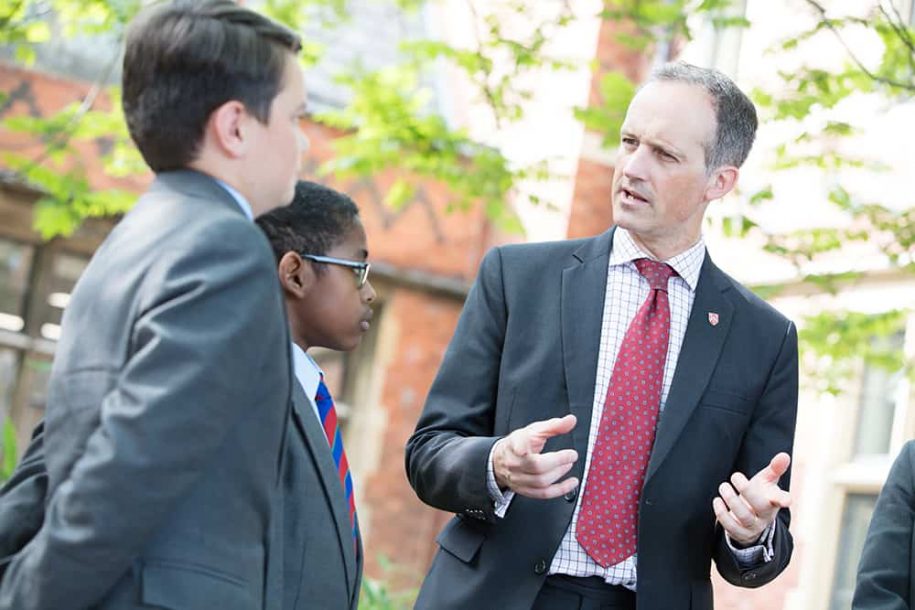Service

This morning the entire school joined together in Quad for our Act of Remembrance, reflecting on those who have died serving their country in the World Wars and subsequent conflicts. On Sunday, the school’s CCF will take a leading role in the town of Loughborough’s Remembrance Day commemorations, leading the parade from School through the town centre, as it does every year. I urged the boys in my address earlier to reflect on the service of young people, not unlike themselves, who had similar dreams and ambitions to their own, but who never had the opportunity to realise their potential and talents. In my conversations with boys on the subject of remembrance, I know that they understand the scale of loss and sacrifice associated particularly with the Great War, the centenary of which we have been celebrating over the last few years, and I am reassured that the names Ypres, Gallipoli, Somme provoke reflection, particularly in the older boys who have studied the topic in their History lessons.
I am conscious, of course, that views on our common acts of remembrance differ, and I acknowledge the unwillingness of many people to wear a poppy, concerned about the implied support for all of British military history, some of which it is difficult to be proud of. Remembrance Day is the time to focus on loss of life rather than a balanced view of the nature of war, but I would like to reassure parents that both sides of the remembrance issue are considered by boys, not only in History, but also in their PSHE.
I wrote last week about my trip to Asia for boarding recruitment. The parents and boys I met had all watched the excellent new film ‘Tom’s Journey’ that we have produced to market the school. (If you have not seen it, please go to the front page of the school website and consider sharing it via social media!) Tom left the Grammar School last summer with some excellent A Levels, he chose not to follow his peers to university, but instead has embarked on RAF pilot training. Consequently, the video features several images of the CCF, and although the idea of CCF is far from unusual for those of us who have experienced British independent education, the international parents I met often found them surprising. On a number of occasions, I had to explain that it was not the aim of Loughborough Grammar School to turn their sons into soldiers. Naturally, in the mid-19th Century when cadet forces were introduced, this was precisely the aim of the government in doing so. However, the aim for cadet forces is now defined thus:
To provide a disciplined organisation within a school so that young people may develop powers of leadership by means of training to promote the qualities of responsibility, self-reliance, resourcefulness, team work, endurance, perseverance and a sense of service to the community.
The CCF provides outstanding opportunities for development of character. Of course, the outdoor pursuits that go with it can be great fun, but sometimes circumstances are tough, such as when poor weather intervenes in a Field Day activity and these ‘character-building’ experiences also help to develop the ‘soft’ skills listed above.
The most positive aspects of CCF in my experience are the promotion of leadership and service. I have known countless boys during my teaching career who credit the CCF as having the most profound influence on their personal development. Those boys who remain in the CCF in the Sixth Form and become NCOs (Non-Commissioned Officers) play a critical role in running a large enterprise, planning and delivering lessons, learning about how to develop relationships and how to influence how other people behave. These skills do not lead to a GCSE or A Level, but are invaluable no matter where one is heading professionally.
The notion of service is an important one. The idea of subjugating one’s needs for the greater good might appear unfashionable in the 21st Century. It might give the impression of passivity, of following rather than leading. However, I would argue that serving helps to develop humility. The media loves referring disparagingly to ‘self-obsessed millennials’ who are too wrapped up in themselves to consider the greater communal good. The act of service to an institution guards against this. Service exists at LGS in many forms: prefects working with younger boys or assisting with school events; senior pupils engaged in Voluntary Service outside school; showing prospective parents around the school or running lunchtime clubs; boys of any age organising charity initiatives.
Service is good for our health too! Research into wellbeing suggests that those who are involved in service in a meaningful way experience greater levels of happiness. Indeed, an article in the press yesterday spoke of how membership of the Scouts led to improved resilience among young people. This combination of external evidence and our own experience in education explains why the Grammar School so values the co-curricular, and why we need to persuade all boys to find ways of serving their school or the community in which they live.
